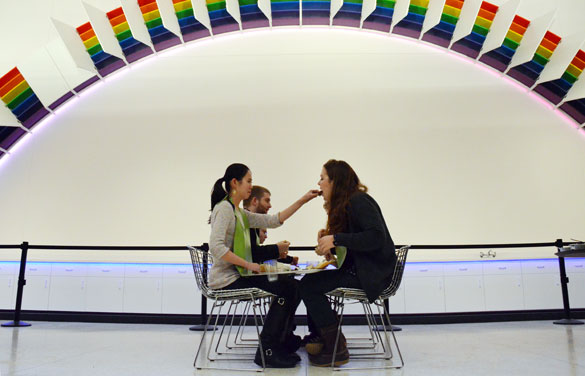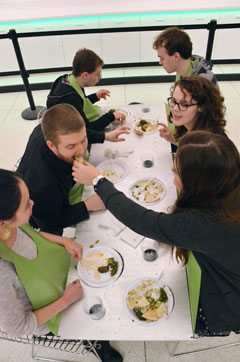I Eat You Eat Me
 Two weeks ago six University of Chicago students shared a memorable dinner around Mella Jaarsma's participatory sculpture in the Smart Museum lobby. Jaarsma's piece, I Eat You Eat Me, is a wearable table: a lightweight metal surface held between six leather yokes that sit over diner's chests like bibs. Jaarsma designed this six-person version for Feast based on a two-person model she has used in open-ended participatory performances in Yogyakarta since 2002. In preparation for the opening of Feast, the students were invited to don the yokes and, balancing the table surface on their knees, were invited to feed each other. Art history student and Smart Museum Student Advisory Committee member James Levinsohn reflects on the experience:
Two weeks ago six University of Chicago students shared a memorable dinner around Mella Jaarsma's participatory sculpture in the Smart Museum lobby. Jaarsma's piece, I Eat You Eat Me, is a wearable table: a lightweight metal surface held between six leather yokes that sit over diner's chests like bibs. Jaarsma designed this six-person version for Feast based on a two-person model she has used in open-ended participatory performances in Yogyakarta since 2002. In preparation for the opening of Feast, the students were invited to don the yokes and, balancing the table surface on their knees, were invited to feed each other. Art history student and Smart Museum Student Advisory Committee member James Levinsohn reflects on the experience:In enacting Mella Jaarsma's piece, I experienced feeding another person and being fed by another person for the first time in my adult life. The experience engendered all sorts of associations, variously centered on species, religious ceremony, age and ability, and politics.
However, through all the associations, one constant remained -- the way the ritual of feeding and being fed articulates power relations. Nourishment is a basic requirement of human life, and being nourished by someone else, however briefly, figuratively places the power of sustaining their life in your hands. Conversely, being fed by someone else gives them the power of sustaining your life. By being in both positions over the course of the performance, I experienced both extraordinary power and extraordinary powerlessness.
 I was both the priest giving communion and the parishioner receiving the body and blood of Christ; I was both the pet owner feeding their parakeet and the parakeet; I was both the baby or the invalid being generously fed by their caretaker, and that caretaker; and I was both the Roman Emperor being fed grapes, and the subjugated slave feeding them grapes.
I was both the priest giving communion and the parishioner receiving the body and blood of Christ; I was both the pet owner feeding their parakeet and the parakeet; I was both the baby or the invalid being generously fed by their caretaker, and that caretaker; and I was both the Roman Emperor being fed grapes, and the subjugated slave feeding them grapes. Through filling both these roles in the course of one performance, power relations emerge as contingent. Mella Jaarsma's piece reinforced my belief that the roles we play in power relations are not innate, but change based on circumstance, and that everyone is simultaneously empowered and deprived of power in different spheres of life. In Mella Jaarsma's piece, our proximity to those we have power towards makes us generous; one wishes this was the case more often outside of art.
Video documentation of the students' dinner will be on view in the gallery, along with the six-person version of the table, and video documentation from a parallel I Eat You Eat Me performance Jaarsma organized in Yogyakarta to coincide with the opening of Feast. Throughout the duration of Feast, a two-person version of the piece will be available to all museum guests to try out at the Smart Cafe.
Images: Students share a dinner with Mella Jaarsma's I Eat You Eat Me wearable table. Photos by Steve Rosofsky, 2012.